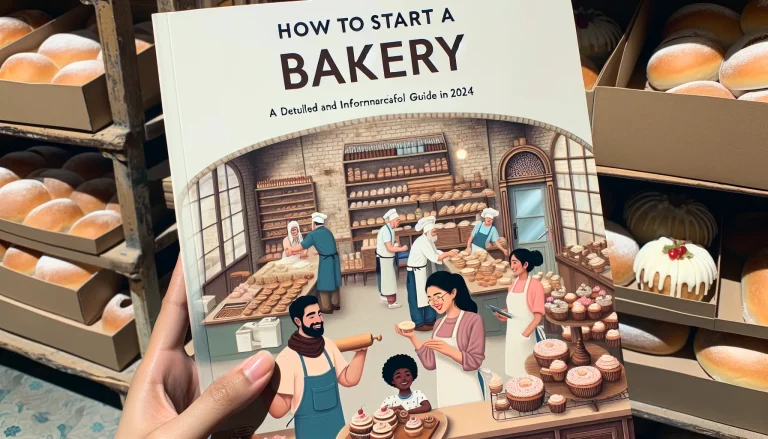Each morning, the intoxicating scent of fresh bread and pastries heralds the dawn; a symphony of flavors served warm from the oven in the journey of starting a bakery. You can be the conductor of this delicious orchestra, the creator of delights such as wedding cakes, cupcakes, and breads.
In a world where gluten-free, vegan, and small-batch artisanal bakeries rule the roost, it’s not merely about mixing flour, butter, and sugar. It’s about entrepreneurship, sustainability, trends, innovation, and yes, an unabashed love for all things sweet and savory. Welcome to the era where bread meets business, and passion kneads profitability.
This guide is your ultimate recipe to venture into the world of baking full-time, with insider tips and expert advice that will help you go from kneading dough in your home kitchen to opening your type of bakery by 2024. Let’s roll!
Delicious Earnings in the Oven 🍞
In May 2022, the median annual wage for bakery businesses was $32,780, showing the financial potential in the world of baking.
Boost customer satisfaction with just a few clicks
Most-Loved Features:
- On-demand drivers
- Real-time GPS tracking
- Delivery confirmation photos
- Over 50% of customers report a smoother delivery experience
Step-by-Step Guide to Crafting Your Bakery Business Plan
Step 1: Defining Your Bakery Concept
Understanding and defining your bakery type is the initial fundamental. It’s not just about deciding what type of pastries or loaves you’re enthusiastic to bake every day, but a more comprehensive view of your bakery’s skeleton.
- Is it a high-end patisserie or an eco-friendly neighborhood bake shop?
- Will it offer gluten-free or vegan options?
- What’s the distinctive selling proposition that makes your bakery stand out?
Jotting down these answers helps to establish the vision for your bakery. This phase isn’t just productive for your business plan but shapes your brand ultimately.
Step 2: Conducting Market Research
Understanding your local market can’t be skipped. Even if your buttery croissants are impressive, if they don’t align with local preferences, your bakery might suffer. To obtain valuable insights:
- Study your direct competition—other bakeries.
- Delve into indirect competition—supermarkets or cafes selling baked goods.
- Understand your target customer’s preferences—are they health-conscious, or do they favor indulgence?
- Gauge how much they’re willing to pay and how often they frequent bakeries.
The gathered data aids in avoiding potential pitfalls, harnessing market opportunities, and fine-tuning your bakery type.
Bakery Boom in the Business 🥖
In 2022, the market size of the bakery cafe and retail bakery sector in the United States reached a delicious high of 17 billion U.S. dollars, reflecting a significant rise from 13.3 billion U.S. dollars in the previous year.
Step 3: Financial Planning
Every aspiring baker’s dream of owning a bakery hinges on comprehensive financial planning. It encompasses:
- Start-up costs including acquiring a location, equipment costs, insurance, and licensing
- Operating expenses such as utility bills, salaries, and ingredient expenses
- A revenue forecast based on realistic estimations of sales and prices
Creating a well-structured financial plan provides a clear view of the investments required and an understanding of when the business becomes profitable. Unearth the critical financial details and true expenses associated with initiating a bakery business in 2024 through our comprehensive guide.
Each step not only builds your bakery cafes but also lays out clear tracks for launching and growing your bakery venture in 2024. By laying out and organizing these thoughts and plans, you’re preparing for a successful bakery marketing strategy. Metrobi facilitates bakery delivery operations, offering delivery services across more than 20 cities in the US, including Seattle.
Flourishing Flavors Across the U.S. 🍪
The market size of the bakery cafe sector in the U.S. has reached a delightful approximate total of 13.3 billion U.S. dollars, showcasing continuous growth over the last decade.
Metrobi is transforming bakery deliveries
Specialized solutions for bakery businesses:
- Bakery-trained drivers
- Proper handling equipment
- Peak day delivery support
- 23% average cost reduction
Essential Equipment for Your Bakery
Expeditiousness and food safety are key parameters for maintaining the integrity of a bakery business. Equipping the bakery business with the right set of tools and appliances and incorporating safety measures not only helps abide by the health guidelines but also enhances the overall efficiency of the baking process.
Baking Tools and Appliances
Baking is as much an art as it is a science. Each type of pastry, bread, or other baked goods requires specialized tools to create bakery products with exquisite taste and perfect texture. Essential professional-grade bakery items and appliances include everything from a commercial mixer and dough sheet to a commercial oven and proofing cabinet. At Metrobi, we extend our expertise to bakeries by offering delivery services across more than twenty cities in the United States, encompassing prompt same-day delivery options in New York City.
TIP – Make sure these tools and appliances are relevant to the bakery type you plan to open.
The commercial mixer is the workhorse of any bakery. Ranging in size, these mixers are designed to handle large quantities of dough and batter. They come in various types—planetary mixers, spiral mixers, and vertical cutter mixers—each with different functionalities to accommodate varying needs as bakery products.
TIP – You may need to adjust the size of the mixer depending on the anticipated volume of your bakery business.
Dough sheeters are also important bakery products. They are useful for making pastries or bread, and automate the laborious process of rolling out dough to a uniform thickness. Commercial ovens come in various types, including deck, convection, and roll-in rack ovens. Each type serves a different purpose and can significantly affect the quality of your baked goods.
TIP – Consider the space your bakery has. Some ovens may not fit, or you may need to consider a different type of oven to accommodate your baking needs in dining space.
Additionally, a proofing cabinet is critical for dough rising. It maintains a warm and humid environment, allowing dough to rise evenly and quickly.
TIP – There are different types of proofing cabinets. Some are built into other equipment like ovens in bakery kitchen.
Expanding Dough in the Bakery Industry 🍞
The US bakery market was valued at a substantial $99.47 billion in 2023, with an expected compound annual growth rate (CAGR) of 2.08% between 2023 and 2028.
Safety and Sanitation Equipment
Compliance with health codes and guidelines is a significant aspect of any food business. For bakery-cafes, incorporating safety and sanitation equipment is crucial to maintain cleanliness and minimize the risk of foodborne illnesses.
TIP – Each state has different health code regulations, so it’s essential to check local laws and guidelines.
Fire suppressant systems and fire extinguishers are fundamental safety equipment pieces every retail bakery owner should have. Other significant safety items include first-aid kits, anti-slip floor mats, and protective clothing.
In terms of sanitation, investing in top-quality dishwashing equipment is paramount. Other essential sanitation equipment includes handwashing stations, sanitizer dispensers, and waste disposal units, ensuring your baking business maintains a clean and healthy working environment.
Technology helps to optimize bakery operations. It plays a vital role in maintaining the quality of the baked goods while adhering to the safety regulations underlined by health guidelines. The right equipment can make your baking business more efficient, safer, and more productive to target customers. After all, a great baker is just as good as their tools.
Understanding Bakery Licensing and Regulations
Health Department Regulations
Navigating health department regulations is a paramount step in starting a bakery business. Ensuring you’re keeping up can shield your business from potential legal consequences and, more importantly, underpin the health and safety of your future customers.
For instance, bakeries have to abide by the guidelines set by the Food and Drug Administration (FDA). The FDA governs every aspect of a food service business – starting from food storage to sanitation practices. One risk you should beware of is cross-contamination. Put simply, cross-contamination is the transfer of harmful substances or disease-causing microorganisms to food, usually by way of non-sanitized equipment or surfaces.
TIP – Depending on your location, you might also have local health codes that apply. Be sure to check your local health department’s regulations to see what rules you need to follow.
Acquiring a Food Service License
A food service license signifies that your type of bakery abides by local health and safety codes. Acquiring a bakery license involves multiple stages that can include submitting an application, an initial inspection, a possible reinspection, and payment of an application fee. Bear in mind, that operating without a bakery business license could result in the closure of your bakery and hefty fines.
Comparing Dough: Wholesale vs Retail Bakeries 💼
Commercial wholesale bakeries have cooked up significant success with $31 billion in revenue, towering over the earnings of retail bakeries. Moreover, the US boasted approximately 205,000 bakers in 2022, highlighting the extensive workforce behind this thriving industry.
Business Licenses and Permits
To kick off your bakery correctly, there are various forms of paperwork to tackle. Bakery business licenses, sales privilege license and permits are the legal prerequisites for opening any business, including a bakery. Consider these the entry tickets to the business spaces and world. At Metrobi, we specialize in distributing bakery goods, ensuring your products reach their destinations efficiently and safely.
General Business License
At the top of the list sits the general business license. This allows your bakery to operate in a particular city or state. It’s renewed periodically, often every one to three years. The fees for a generak business license vary by city and state, so it is important to check with your local government to understand the costs involved.
Specialized Permits
Depending on the nature of your bakery and your location, you may also need additional permits. These can include a bakery or food establishment permit, a sales permit, and a signage permit. The key here is to identify what applies to your business case and get it in place before opening your doors to loyal customers.
Understanding and following the required regulations and licensing procedures will instill trust and professionalism in your bakery. Not to mention, catering license keeps your business running smoothly, ensuring you meet your local, state, and federal requirements. With business continuity in mind, these cast-iron measures act as a solid foundation for the success and longevity of your bakery.
Rising Stars: The Home Baking Boom 🏡
By 2023, the market for home bakeries supplying baking ingredients is projected to reach $15.6 billion, indicating a significant rise in home baking ventures.
Effective Marketing Strategies for Your Bakery
Building a Strong Online Presence
The bakery industry thrives on sensory appeal. A strong online bakery presence gives you the platform to share appealing imagery and narrate your unique story. Whether you’re whipping up artisanal bread or sculpting bespoke cakes, sharing this process digitally reels in potential customers. Interested in taking your bakery business to the next level? Discover how a well-crafted website for your bakery can entice more customers by showcasing your delicious creations and unique baking journey.
Social Media Engagement
1 in 3 people discover new brands and products through social media accounts. Harness the power of platforms such as Instagram and Facebook to showcase your best bakery creations, highlight loyal customer reviews, and promote special offers. These platforms can be useful for commercial bakeries and successful business.
Creating an Easy-to-Navigate Website
Your website is your digital storefront. Make it easy for visitors to find bakery opening hours, browse your product offerings, and place orders. Remember, a clear and user-friendly website equals satisfied customers. This tutorial explains how to establish a website for your bakery, enabling you to market cookies, cakes, pies, and additional treats on the internet.
Utilizing SEO Strategies
Improve your bakery’s online visibility by implementing Search Engine Optimization (SEO) strategies. This includes using relevant keywords in your content and regularly posting blog articles on your website.
Local Bakery Marketing Strategies
Never underestimate the value of local marketing in a bakery business. Create a bond with your community and see your customer base grow. You need to provide a good customer service.
Joining Local Food Events
Participate in local food festivals, farmers’ markets, or community events. This offers the opportunity to showcase your products, attract new customers, and solidify your status within the local community.
Collaborating with Local Businesses
Form connections with local business owners for mutual benefit. For example, consider providing baked goods to local cafes or partnering with a culinary school for workshops.
Leveraging Local Media
Get your bakery featured in local newspapers, radio stations, and TV news for commercial space. This offers free publicity and helps increase your visibility within the community of business owners.
With these marketing strategies, your artisanal bakery business is well-positioned to attract a loyal customer base, both online and locally. Remember, the key to successful B2B marketing is staying true to your brand while effectively engaging your target audience.
Crunching the Numbers: America's Cookie Craze 🍪
Cookies ranked as the country’s second-favorite baked product, with sales soaring over eight billion U.S. dollars.
Home-based Bakery vs Storefront Bakery: Which is Right for You?
Pros and Cons of a Home-based Bakery
Launching your dream bakery right from your home kitchen can seem like a cozy idea. It’s wonderful to whip up tantalizing pastries in the comfort of your home, but it’s essential to be privy to the trade-offs. Begin your journey into entrepreneurship with our comprehensive guide on how to start a bakery business from home, which includes insights on navigating through legal requirements, setting up your kitchen, and implementing effective marketing strategies to ensure your venture is a delectable success.
Pros:
1. Lower startup costs, flexibility in work hours, and the convenience of working from home are some of the most compelling perks.
2. Due to Cottage Food Laws, home bakers can typically operate without commercial-grade kitchen equipment, depending on local regulations.
Cons:
1. Limited space to work and store ingredients, potential conflict balancing personal and work life in the same space, and restrictions on the types of food you can sell may be potential challenges of running a home bakery.
Moving from marketing efforts to operational plans, the choice of bakery location plays an integral role. Keep reading to compare this setup with its retail counterpart, and decode what might be more suitable for your aspirations. Uncover the ideal bakery locations by following our guide, which uncovers America’s secret favorites and top picks for memorable pastries and sweets.
Pros and Cons of a Storefront Bakery
A storefront bakery can infuse that irresistible ‘fresh bread’ scent into the heart of a bustling street. However, this appealing vision comes with its own set of benefits and hindrances.
Pros:
1. Improved visibility, the ability to showcase your products to passersby, and an expanded workspace for baking and display can often provide a better customer experience.
2. Moreover, there’s the chance to turn the bakery into a community space and attract more foot traffic, which is less likely with a home bakery.
Cons:
1. Higher initial costs, increased overhead costs such as rent and utility bills, and longer work hours may put more pressure on your specialty bakery to perform and generate profits.
Both home-based, storefront or wholesale bakery options have their unique pros and cons. It boils down to the baker’s aspirations, financial considerations, and the desired scalability. By now, you should have a clear comparison of the two types of bakeries to help you make your business decision.
Sealing the Dough: Steps Forward for Starting a Bakery
Starting your bakery might look like a mountain, but you’re now equipped to climb it. You’ve learned the basics of setting up a shop, the type of equipment you need, marketing essentials, and important legal matters.
Undoubtedly, it’s the sweet aroma of freshly baked bread, a delighted customer’s smile, and the fulfillment of your entrepreneurial dream that makes this journey rewarding.
So, you’re ready! And the only unanswered question is: What will your signature bake be? Your next step is to fine-tune your baking skills and craft that masterpiece that will have your customers coming back for more.
Remember, the secret ingredient of a successful bakery is the passion and love that goes into creating every treat. Keep that flame burning!
Now, roll up those sleeves, and let’s get that oven preheating. After all, the world is waiting to taste your magic. Just imagine, soon, ‘Baker Extraordinaire’ will be your new title. How does that sound?














